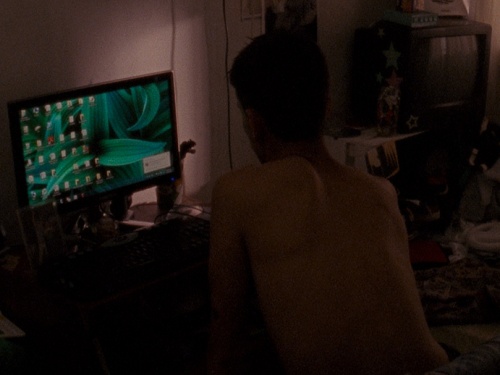Algorithmic Citizenship: Laura Poitras, James Bridle and the Digital Self
Following our Q&A with CITIZENFOUR director Laura Poitras, Ben Murray, Editor of The Space, explores the concept of ‘algorithmic citizenship’, which underlies its most recent commission, Citizen Ex, by artist James Bridle.
Laura Poitras’s Oscar-winning film CITIZENFOUR documents Edward Snowden’s efforts to expose the intrusive practices of the NSA and other security agencies in the post-9/11 world. In a hotel room in Hong Kong, Snowden outlines to Poitras and former Guardian reporter Glenn Greenwald the methods the NSA have employed to collect data relating to millions of electronic communications around the globe.
One of the techniques used to legitimize this ‘capture all’ approach involves calibrating a target’s citizenship based on the way they appear online, thus circumventing some of protections traditional citizenship is afforded.
Networked technology, with its much more fluid conception of what constitute international borders and personal identity, is producing a new version of citizenship extrapolated from our online movements, which bounce from country to country with every click. This exposes us to a web of jurisdictional and regulatory regimes beyond our ‘home’ state.
This is what artist James Bridle terms our ‘algorithmic citizenship’ – the way we appear to the network. Created as a browser plug-in, Bridle’s latest project, Citizen Ex shows us the physical locations of the sites we visit as we traverse the web. Every mouse click leaves a trace, as our personal data is collected in locations around the globe.
This reduces us to something calculable, which has implications for our understanding of privacy, citizenship and the self. Individual choice about what is private is being eroded, as citizens are transformed into tradable data objects.
Key to algorithmic citizenship is its link with the broader concept of ‘algorithmic identity’, which is derived from the systems that track us, and the mass of data this offers up for analysis and commercial exploitation. This new identity is determined by the interplay of code and algorithms that are weighted toward maximum efficiency, economic extraction and surveillance, and has little to do with notions of social cohesion, democratic expression or personhood.
The real-time data captured is used to target specific content and advertisements that tally with the various categorisations into which the identity fits at any given moment. As the scale and scope of algorithmic oversight grows, many believe we are losing control over defining who we are online. This can have very serious implications for our real lives.
Patterns of online behaviour that, for whatever reason, fall into the ever more broadly defined categories deemed suspicious, are the most obvious example of this. But the issue is far subtler than that. The technological devices we’ve made, the connecting architectures and the code that animates them, mediate our relationship to the world in many profound, invisible ways. This has consequences for how we gather information, interact with one another, form opinions and define our common goals, and relates to the way in which the design and operation of networked information technologies mirror existing power structures and serve established interests.
The formation of online identity, the processes of self-determination and cultural formation all become prone to compromise, defined by the protocols of targeted content delivery, algorithmically defined search and data-scraping social media. We become participants in the information-mining and surveillance mechanisms that power the system.
This has a knock-on effect for ‘citizenship’, which becomes subject to the reconfiguring effects of the network. This ecology does not determine citizenship in the traditional manner. Legal scholar Julie Cohen calls it a "new regulatory landscape" in which "there is no countervailing set of rules broadly distributing responsibility for promoting human flourishing and enabling the practice of citizenship."
Bridle refers to the NSA’s purported methodology:
“the arbiter of citizenship is not a passport but a set of behaviours and attributes classified by a fixed system. A certain day’s gathered criteria might assign us the required 51% confidence to be afforded the protection of the state; another trawl of data might relegate us to 49%, leaving us adrift...The rights and opportunities that supposedly flow from our citizenship status thus become as unstable and arbitrary as those of stateless persons.”
This new interpretation of citizenship constitutes a radical shift away from historical precedent. It begs the question of exactly what a citizen is in a digital world, and how rights and obligations are constantly affected by such a shift. It also opens the door to a far murkier world of which, as the matrix grows about us, we should all be aware. ■
Laura Poitras was in conversation with Hito Steyerl, as part of Fear of Missing Out, a three-day event bringing together leading international theorists, academics, social thinkers and artists to discuss postdigital anxieties and the social condition.
Citizen Ex is a new artwork by James Bridle, co-commissioned by The Space and Southbank Centre.
This article is posted in: Articles, Blog, Events
Tagged with: Identity, Identities, Citizenship, Laura Poitras, James Bridle, CITIZENFOUR, Citizen Ex, NSA, Fear of Missing Out, FOMO, Network, Surveillance, Surveillance Society, events, Film







